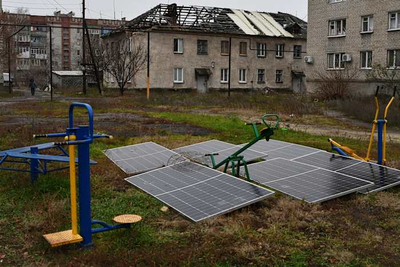
As the nearly three-year-long Russia-Ukraine war rages on, one would think that Ukraine's energy infrastructure is under constant siege. However, in a surprising twist, this conflict has inadvertently accelerated a transition to clean energy in the country.
Accelerated Transition to Clean Energy
The Russia-Ukraine war has destroyed large swaths of Ukraine, leaving behind devastated cities and towns. Amidst this chaos, Ukraine's government has made significant strides towards transitioning its energy sector from traditional fossil fuels to cleaner sources like wind and solar power.
This shift is largely attributed to the decentralized nature of these clean energies. Unlike centralized systems that rely on a single source of power generation, decentralized systems are more scattered, making them less susceptible to damage in the event of an attack.
Decentralized Energy: A Key Factor in Ukraine's Resilience
Ukraine's experience with decentralized energy is exemplified through its largest private energy company, DTEK. The company's solar farms have been targeted by Russian attacks multiple times this year, but the company has managed to restore power within a short span of time.
In one instance, two DTEK solar farms were attacked in spring, destroying many solar panels and some transformers. However, with swift replacement efforts, the facilities were back up in just seven days. This rapid restoration is a testament to the resilience of decentralized energy systems.
Ukraine's Resistance Inspires Global Partnerships
The Ukrainian government has taken note of the benefits of decentralized energy and has been actively promoting public-private partnerships to support its transition to clean energy. This strategy has attracted global attention, with companies like GE Vernova and Honeywell partnering with DTEK for major wind and battery storage projects in Ukraine.
Roger Martella, chief sustainability officer for GE Vernova, emphasized the importance of developing public-private partnerships in lowering risk and making investment more attractive. The successful collaboration between these global giants has inspired other companies to follow suit.
U.S. Support for Ukraine's Energy Sector Continues
Geoffrey Pyatt, assistant secretary of the U.S. State Department's Bureau of Energy Resources, expressed his confidence in continued U.S. support for Ukraine's energy sector, regardless of the incoming Trump administration's stance. He highlighted that big American companies like GE and Fluxus have already started investing billions of dollars in energy reconstruction efforts.
Pyatt also praised Ukraine's resilience in maintaining its grid despite being under attack. This unwavering commitment to energy security has earned international recognition, with the G7 nations offering widespread support for Ukraine's energy systems.
A New Era in Energy Reconstruction
The partnership between Ukraine and global companies is a significant step towards rewriting the rules of energy reconstruction. By leveraging public-private partnerships and investing heavily in clean energy sources, Ukraine has become an exemplary model for countries seeking to transition their energy sectors.
As Russia continues to wage war on Ukraine's energy infrastructure, the country remains steadfast in its commitment to clean energy. This resilience, combined with growing international support, has set the stage for a new era in energy reconstruction – one that prioritizes decentralization and sustainability above all else.